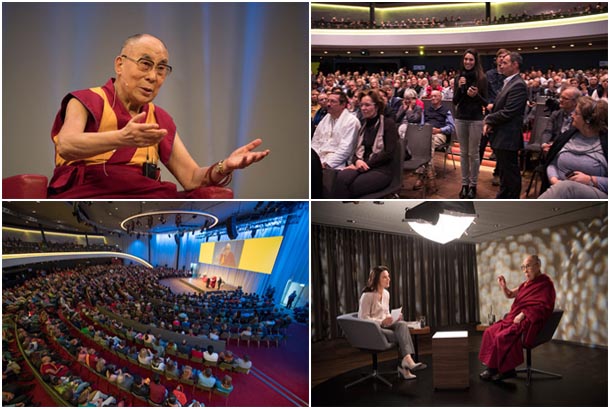 Bern, Switzerland — As social animals, all 7 billion human beings need friends—so why do we fight and kill each other? Whether we are educated or not we tend to see each other in terms of ‘us’ and ‘them’, which is a basis for conflict," His Holiness the Dalai Lama of Tibet said while addressing an audience of 1400, about "dialogue and solidarity in the Global Crisis".
Bern, Switzerland — As social animals, all 7 billion human beings need friends—so why do we fight and kill each other? Whether we are educated or not we tend to see each other in terms of ‘us’ and ‘them’, which is a basis for conflict," His Holiness the Dalai Lama of Tibet said while addressing an audience of 1400, about "dialogue and solidarity in the Global Crisis".
“We are human beings, we all have the ability to take a longer term, more holistic view. We have this marvellous intelligence. If we look at a problem close to, it often seems very grave, but if we can see it from a wider perspective it may not look so serious.”
“In the early 20th century when nations went to war, citizens unquestioningly joined up in support. Later in the century that attitude seems to have changed. Adenauer and de Gaulle’s efforts to form what has become the European Union put an end to hostility between Germany and France. Millions across the world marched to oppose war in Iraq,' His Holiness said in an interview to Amira Hafner-Al Jabaji for the Swiss National TV programme Sternstunde Philosophie.
“In 1996 I asked the Queen Mother of England, who had observed almost the entire 20th century in her life, whether she felt things had improved, stayed the same or got worse. She unhesitatingly said they had got better, remarking that in her youth there was no talk as there is now of human rights and self-determination.
“Elsewhere totalitarian regimes have been brought down by their own people. In China, where religion came under attack during the Cultural Revolution, 400 million Buddhists and about 200 million Christians have recently emerged.
“Certainly there are grounds to be optimistic. Scientists’ findings that basic human nature is positive and compassionate is a source of hope. More and more people are coming to understand that peace of mind is good for the well-being of individuals and the community at large. "
In the Kursaal Arena, President of the House of Religions, Giorgio Albisetti introduced His Holiness to an audience of 1400 and asked him to speak to them about dialogue and solidarity.
“Senior respected brothers and sisters and my other brothers and sisters, as social animals all 7 billion human beings need friends—so why do we fight and kill each other? It’s because we tend to focus too much on secondary differences between us, differences of nationality, race, faith, poverty and wealth, whether we are educated or not. We tend to see each other in terms of ‘us’ and ‘them’, which is a basis for conflict. On top of that we short-sightedly only look to temporary goals.
“The only remedy is to look at things on the deeper, more fundamental level of our being physically, mentally and emotionally the same. We need to see ourselves as equal human beings. Once we see ourselves as human brothers and sisters there’ll be no basis for harming or killing each other. So we need to develop a sense of the oneness of humanity.
“I want to share with you my commitment to promoting human happiness. We tend to think that happiness comes from money and power without seeing the role of the mind and that the key is inner peace. When we’re mentally distressed physical comfort brings little relief, whereas we can often withstand physical pain if we are mentally at peace. Modern life-style is focussed on material goals which are not sufficient in and of themselves to bring about inner peace. So my first commitment is to educating people to the prospect that warm-heartedness brings inner peace and that a healthy mind supports sound physical health. We all want to live a happy life and to do so is our right, but instead of fulfilling material goals what we need is to cultivate inner values.”
“Whenever we face conflicts of interest,” he observed, “we have to think on a global level. We are interdependent," His Holiness said while declaring his second commitment to be the fostering of harmony among religions and repeated his appreciation of the active contribution the House of Religions can make to this.
We need each other. In the globalised world in which we now live clinging to notions of ‘my nation, my faith, my community’ is out of date. We need instead to be much more aware of the oneness of humanity and on that basis meaningful dialogue can come about. We have acknowledgement of others rights and interests.
“I often say that since the last century was an era of such great violence we have to take the welfare of others into account and make this a century of dialogue. Such an emphasis on dialogue requires a sense of solidarity with all human beings.
“If you feel anything I’ve said is useful, please think more about it. Discuss it with your friends. That’s the way ideas spread. It’s not a matter of praying to Jesus, the Buddha or Allah to solve our problems for us.”


![Tibet has a rich history as a sovereign nation until the 1950s when it was invaded by China. [Photo: File]](/images/stories/Pics-2024/March/Tibet-Nation-1940s.jpg#joomlaImage://local-images/stories/Pics-2024/March/Tibet-Nation-1940s.jpg?width=1489&height=878)















